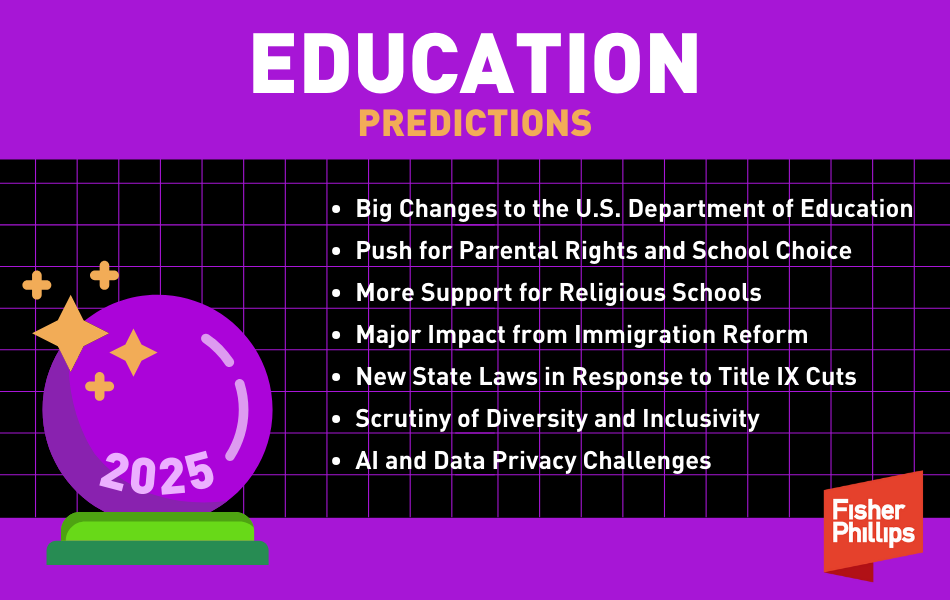Our Education thought leaders have pulled together their top predictions for the new year so that higher education institutions and K-12 private and independent schools can get a running start to 2025.

Big Changes to the U.S. Department of Education (DOE)
A second Trump term is sure to bring sweeping education policy changes impacting both higher education and private and independent K-12 schools. While the president-elect has promised to shut down the DOE, he will probably be unable to get the Congressional approval required to do so. However, the new administration will likely scale back the agency’s power and responsibilities in other ways, leading to more state autonomy over education for K-12 schools and potentially causing disruptions to student aid and student loan programs for colleges and universities.
Federal Push for Parental Rights and School Choice for Private and Independent Schools
We will also see the incoming administration push for more parental empowerment in K-12 education, a movement that has swept across red states in recent years. This will include giving parents broader rights to control their children’s education (and making public funds available to families who choose to send their kids to private schools. While voters rejected school choice initiatives on several state ballots in November, Trump said that his nominee to lead the DOE, Linda McMahon, will fight tirelessly to expand universal school choice at the federal level for all states.
More Support for Religious Schools
The first Trump administration was hugely supportive of religious liberty and religious exemptions, and we expect the same from the second term. For religious schools, we anticipate will see the next four years bring some combination of broader support for schools enforcing their religious tenets and broader interpretations of religious school exemptions like the ecclesiastical exemption, the religious exemption under Title III of the Americans with Disabilities Act, and the ministerial exemption.
Immigration Reform Will Significantly Impact Schools
Schools and their student bodies will be particularly impacted by the incoming Trump administration’s pledge to launch the largest deportation operation in U.S. history and end the Deferred Action for Childhood Arrivals and Temporary Protected Status for several countries. U.S. colleges and universities braced for the incoming changes by advising international students to adjust their winter break travel plans to ensure they return to campus before Inauguration Day. While schools can currently enroll K-12 students regardless of immigration status, it’s unclear whether that option will remain in 2025 and beyond. Expect to possibly see movement towards using school enrollment as another “opportunity” to ask about immigration status.
Court-Blocked Title IX Rule Will Not Be Revived, But States Could Take Protective Measures
A federal court just blocked the Biden administration's sweeping Title IX rule – effectively wiping the entire rule off the books for all schools nationwide. The DOE has little chance of resurrecting the rule through an appeals court before a second Trump term begins, and we predict the 2024 rule, which included protections for LGBTQ+ students, will be dead once Trump takes office. While there’s never been federal protection for private school transgender students (other than at those schools subject to Title IX), be aware of any applicable state laws and anticipate that some states will respond to the expected Title IX cuts through proactive legislative changes.
Increased Scrutiny of Diversity and Inclusivity
This year we saw courts start to define the boundaries of permissible DEI programs in the aftermath of last year’s SCOTUS decision limiting “race conscious” programs such as affirmative action in college admissions. Some of these decisions, along with Trump’s clear stance against DEI initiatives, may cause concern for schools that provide affirmative action opportunities. They also serve as a reminder to review your financial aid, fellowships, and other inclusion programs to ensure they comply with federal equal rights and state law.
Continued Challenges Involving Artificial Intelligence and Data Privacy
Artificial intelligence creates dual challenges for education leaders who must determine appropriate use of generative AI among their students as well as their administrators and faculty (click here for five tips for crafting higher ed AI workplace policies). We expect increased litigation and other issues in this area in 2025, much like this recent court decision that backed the school in an AI cheating case, or this cautionary tale about education officials who released a document riddled with false citations because GenAI had been used to create it. We also expect more data privacy challenges, similar to the PowerSchool cyberattack announced earlier this month that impacted thousands of schools and over 50 million students.
Want More?